|
#1
| |||
| |||
|
Will you please provide me question paper for Civil services Geography Prelims Examination ?
|
|
#2
| |||
| |||
|
Here I am giving you question paper for Civil services Geography Prelims Examination in PDF file attached with it so you can get it easily.. 1. Write short notes on the following in about 150 words each : 12x5=60 (a) Palaeozoic glacial evidence for Continental Drift. (b) Systems approach to landform analysis. (c) Compare and contrast tropical cyclone and temperate cyclone. (d) Major components of IGBP. (e) Different layers of ocean water above abyssal plain. 2. Answer the following in about 400 words each : (a) Explain how Bosche and Haldenhang lead to the Theory of Slope Replacement. 30 (b) Classify airmaises and explain how `cP' airmass affects global climate. 30 3. Answer the following in about 250 words each : (a) Discuss how different types of mining lead to different types of environmental problems. 20 (b) Adaptation and distribution of animals in the Ethiopian realm. 20 (c) Impact of Cryosphere on global climate. 20 Answer the following in about 250 words each : (a) Characteristics of the standard epigene cycle of erosion. 20 (b) Programmes initiated by the International Council of Science on Earth System studies. 20 (c) "Atolls present the most challenging explanation in the evolution of coral reefs", Discuss. 20 Section `B' 5. Write short notes on the following in about 150 words each : 12x5=60 (a) Relevance of distance decay principle in Indian cities. (b) Impact of migration on urban demography. (c) Similarities in the population distribution of southern continents and reasons for the same. (d) Status of infant mortality rate in the world. (e) Problems faced by industries which developed due to inertia. 6. Answer the following in about 400 words each : (a) Evaluate the various models on population density distribution in urban centres. 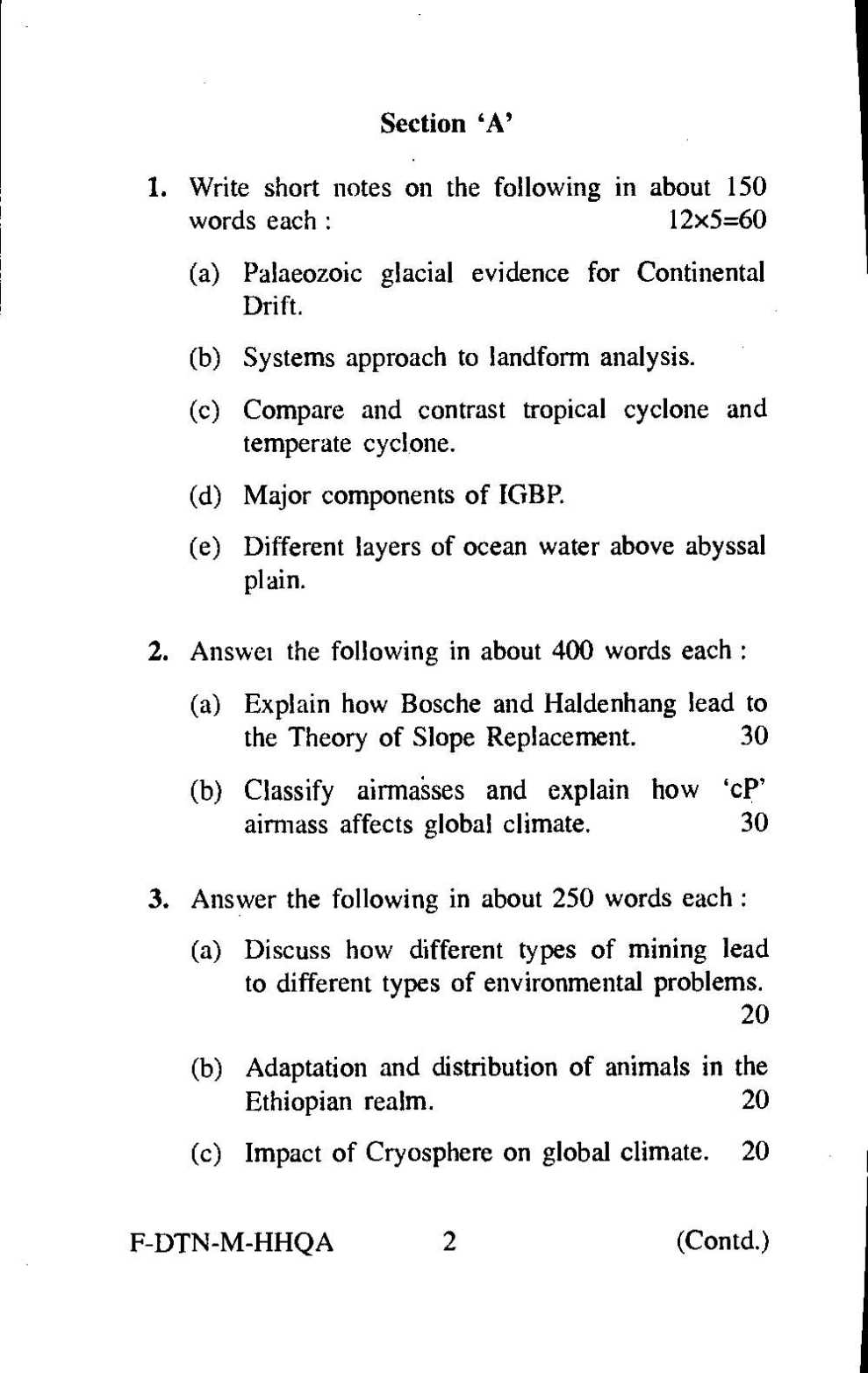  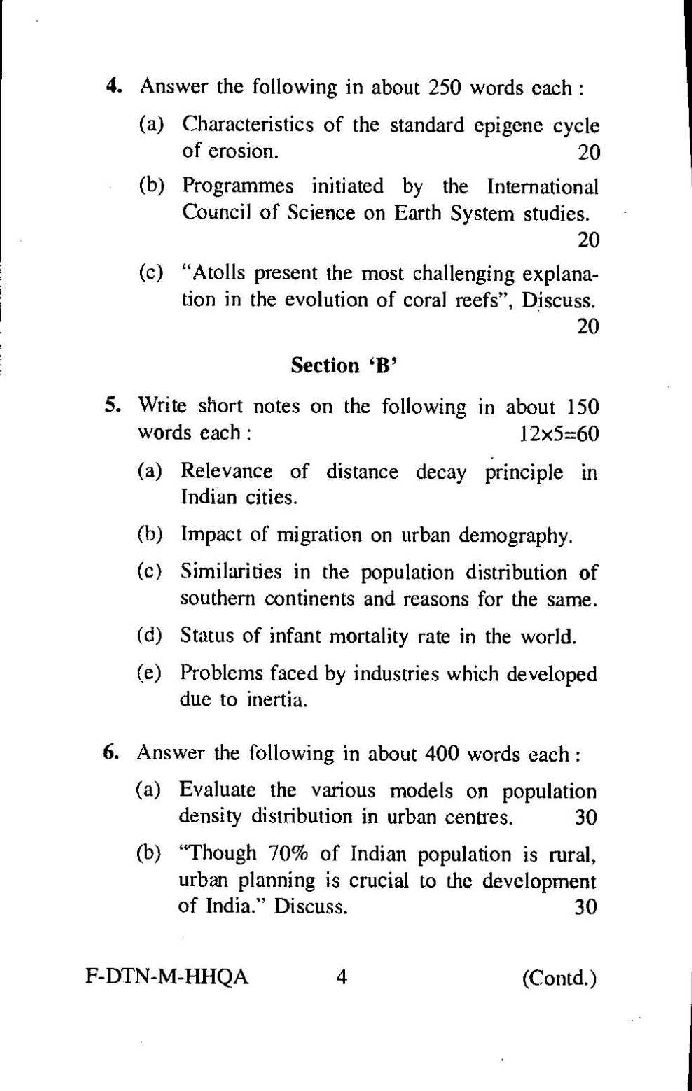 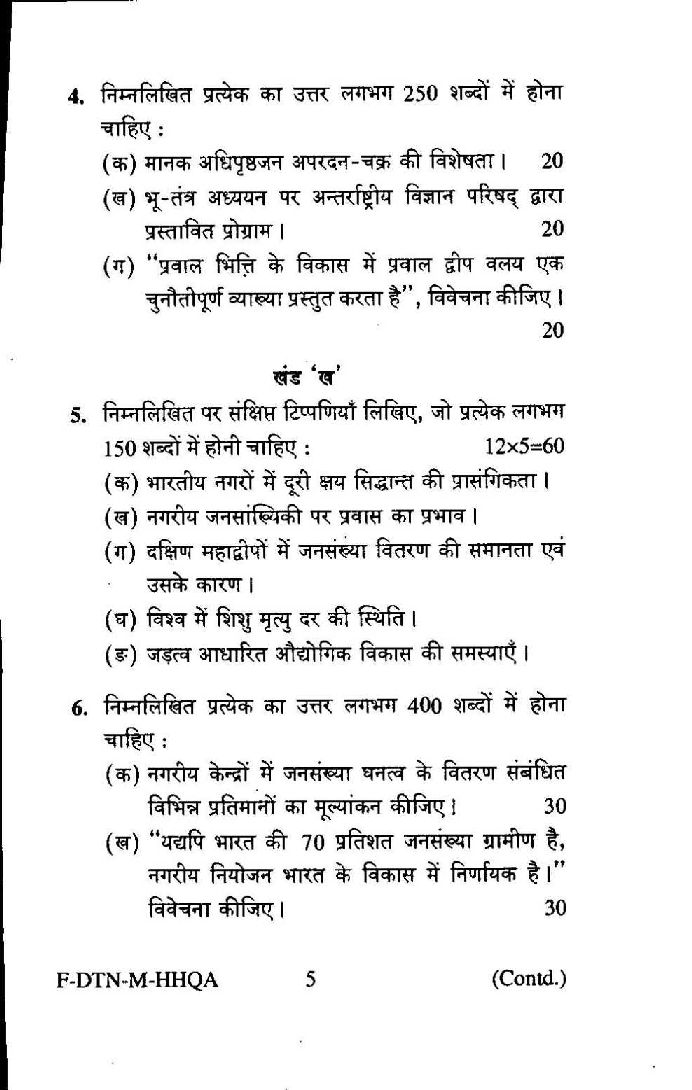 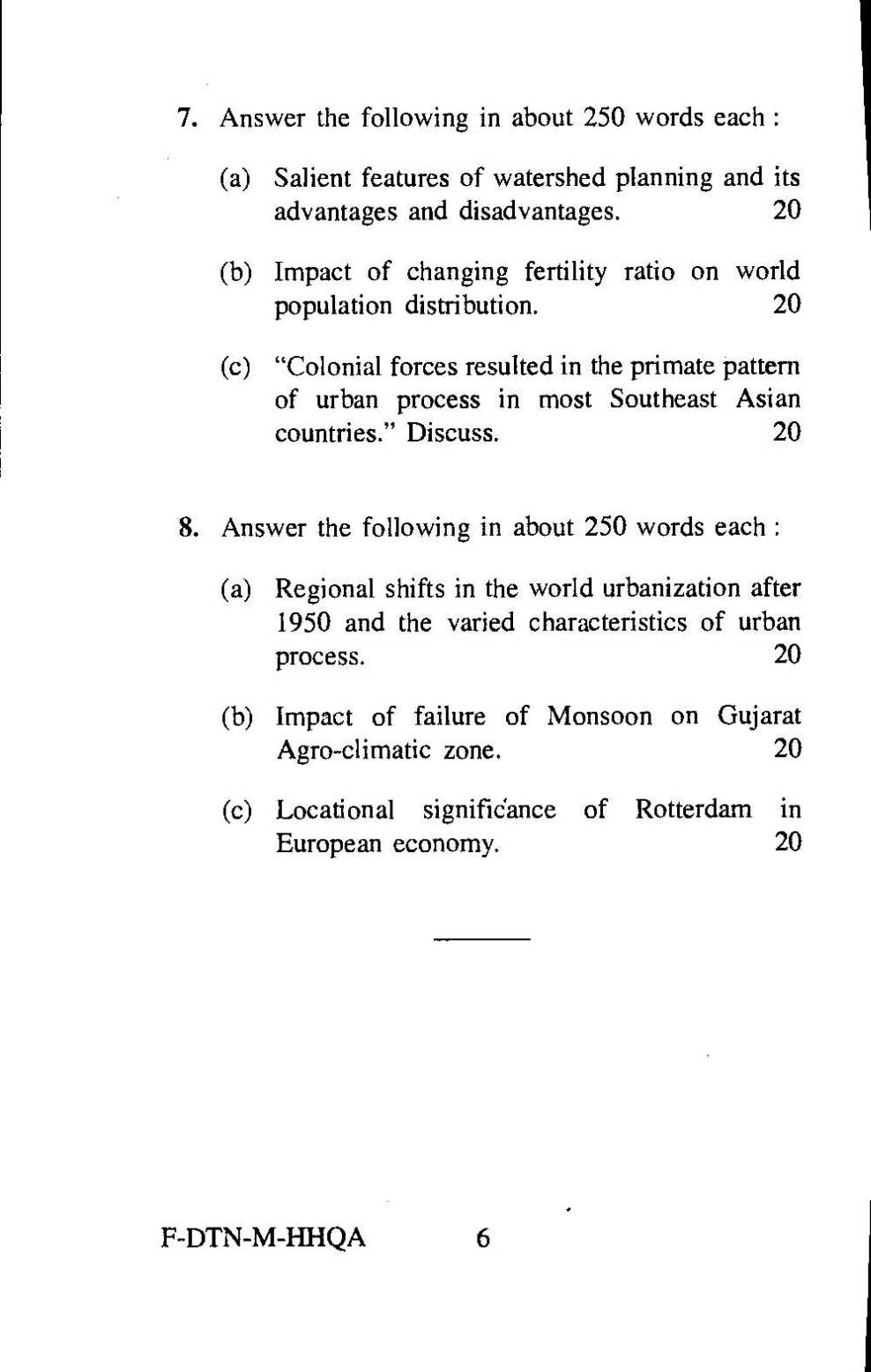 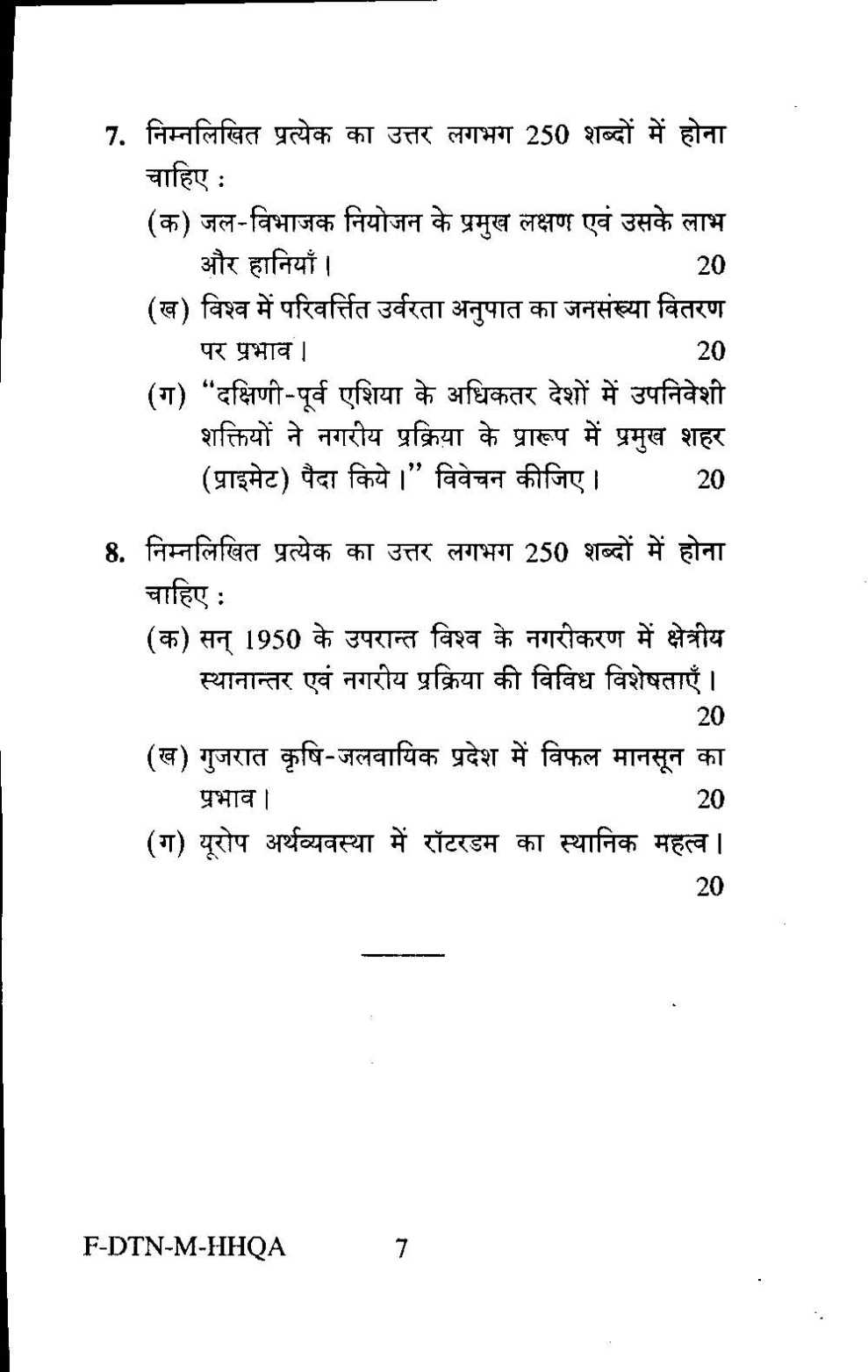 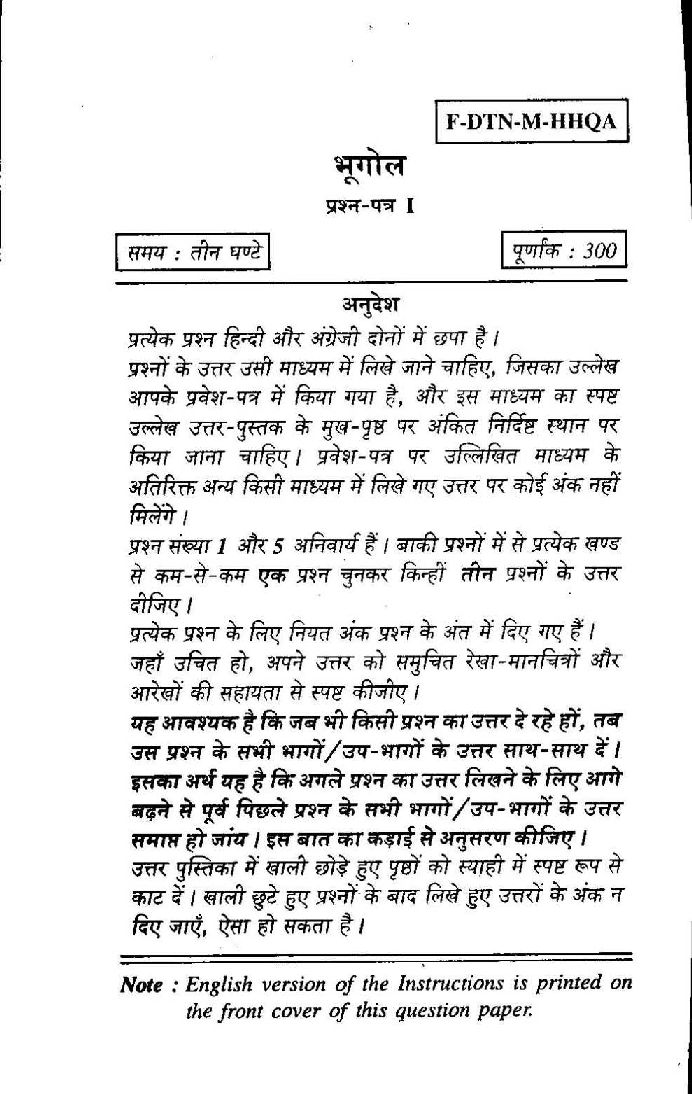 
__________________ Answered By StudyChaCha Member |
|
#3
| |||
| |||
|
Civil Services Prelim exam Geography paper contains following syllabus: Principles of Geography Physical Geography i) Geomorphology : Factors controlling landform development; endogenetic and exogenetic forces; Origin and evolution of the earth's crust; Fundamentals of geomagnetism; Physical conditions of the earth's interior; Geosynclines; Continental drift; Isostasy; Plate tectonics; Recent views on mountain building; Vulcanicity; Earthquakes and Tsunamis; Concepts of geomorphic cycles and Landscape development ; Denudation chronology; Channel morphology; Erosion surfaces; Slope development ;Appl ied Geomorphology: Geohydrology, economic geology and environment ii) Climatology : Temperature and pressure belts of the world; Heat budget of the earth; Atmospheric circulation; atmospheric stability and instability. Planetary and local winds; Monsoons and jet streams; Air masses and fronto genesis, Temperate and tropical cyclones; Types and distribution of precipitation; Weather and Climate; Koppen's, Thornthwaite's and Trewartha's classification of world climates; Hydrological cycle; Global climatic change and role and response of man in climatic changes, Applied climatology and Urban climate. iii) Oceanography : Bottom topography of the Atlantic, Indian and Pacific Oceans; Temperature and salinity of the oceans; Heat and salt budgets, Ocean deposits; Waves, currents and tides; Marine resources: biotic, mineral and energy resources; Coral reefs, coral bleaching; sealevel changes; law of the sea and marine pollution. iv) Biogeography : : Genesis of soils; Classification and distribution of soils; Soil profile; Soil erosion, Degradation and conservation; Factors influencing world distribution of plants and animals; Problems of deforestation and conservation measures; Social forestry; agro-forestry; Wild life; Major gene pool centres. v) Environmental Geography : Principle of ecology; Human ecological adaptations; Influence of man on ecology and environment ; Global and regional ecological changes and imbalances; Ecosystem their management and conservation; Environmental degradat ion, management and conservation; Biodiversity and sustainable development; Environmental policy; Environmental hazards and remedial measures; Environmental education and legislation. Human Geography i) Perspectives in Human Geography : Areal differentiation; regional synthesis; Dichotomy and dualism; Environmentalism; Quant i tat ive revolut ion and locat ional analysis; radical, behavioural, human and welfare approaches; Languages, religions and secularisation; Cultural regions of the world; Human development index. ii) Economic Geography : : World economic development: measurement and problems; World resources and their distribution; Energy crisis; the limits to growth; World agriculture: typology of agricultural regions; agricultural inputs and productivity; Food and nutrition problems; Food security; famine: causes, effects and remedies; World industries: locational patterns and problems; patterns of world trade. iii) Population and Settlement Geography : Growth and distribution of world population; demographic attributes; Causes and consequences of migration; concepts of over - under-and optimum population; Population theories, world population problems and policies, Social well-being and quality of life; Population as social capital. Types and patterns of rural settlements; Environmental issues in rural settlements; Hierarchy of urban settlements; Urban morphology: Concepts of primate city and rank-size rule; Functional classification of towns; Sphere of urban influence; Rural - urban fringe; Satellite towns; Problems and remedies of urbanization; Sustainable development of cities. iv) Regional Planning : Concept of a region; types of regions and methods of regionalisation; growth centres and growth poles; regional imbalances; environmental issues in regional planning; planning for sustainable development. v) Models, Theories and Laws in Human Geography : System analysis in Human Geography; Malthusian, Marxian and Demographic Transition models; Central Place theories of Christaller and Losch; Von Thunen's model of agricultural location; Weber's model of industrial location; Rostov's model of stages of growth. Heart-land and Rimland theories; laws of international boundaries and frontiers. Note : Candidates will be required to answer one compulsory map question pertinent to subjects covered by this paper. PART II Geography Of India 1. Physical Setting: Space relationship of India with neighboring countries; Structure and relief; Drainage system and watersheds; Physiographic regions; Mechanism of Indian monsoons and rainfall patterns, Tropical cyclones and western distur - bances; Floods and droughts; Climatic regions; Natural vegetation; Soil types and their distributions. 2. Resources: Land, surface and ground water, energy, minerals, biotic and marine resources; Forest and wild life resources and their conservation; Energy crisis. 3. Agriculture: Infrastructure: irrigation, seeds, fertilizers, power; Institutional factors: land holdings, land tenure and land reforms; Cropping pattern, agricultural productivity, agricultural intensity, crop combination, land capability; Agro and socialforestry; Green revolution and its socioeconomic and ecological implications; Significance of dry farming; Livestock resources and white revolution; aqua - culture; sericulture, apiculture and poultry; agr icul tural regional isat ion; agro-cl imat ic zones; agro- ecological regions. 4 . Industry : Evolution of industries ; Locational factors of cotton, jute, textile, iron and steel, aluminium, fertilizer, paper, chemical and pharmaceutical, automobile, cottage and agro-based industries; Industrial houses and complexes including public sector undertakings; Industrial regionalisation; New industrial policies; Multinationals and liberalization; Special Economic Zones; Tourism including eco -tourism. 5. Transport, Communication and Trade: Road, railway, waterway, airway and pipeline networks and their complementary roles in regional development; Growing importance of ports on national and foreign trade; Trade balance; Trade Policy; Export processing zones; Developments in communication and information technology and their impacts on economy and society; Indian space programme. 6. Cultural Setting: Historical Perspective of Indian Society; Racial, linguistic and ethnic diversities; religious minorities; major tribes, tribal areas and their problems; cultural regions; Growth, distribution and density of population; Demographic attributes: sex-ratio, age structure, literacy rate, work-force, dependency ratio, longevity; migration (inter-regional, intra- regional and international) and associated problems; Population problems and policies; Health indicators. 7. Settlements: Types, patterns and morphology of rural settlements; Urban developments; Morphology of Indian cities; Functional cla ssification of Indian cities ; Conurbations and metropolitan regions; urban sprawl; Slums and associated problems; town planning; Problems of urbanization and remedies. 8. Regional Development and Planning: Experience of regional planning in India; Five Year Plans; Integrated rural development programmes; Panchayati Raj and decentralised planning; Command area development; Watershed management; Planning for backward area ,desert , drought prone, hill, tribal area development; multi-level planning; Regional planning and development of island territories. 9. Political Aspects: Geographical basis of Indian federalism; State reorganisation; Emergence of new states; Regional consciousness and inter state issues; international boundary of India and related issues; Cross border terrorism; India's role in world affairs; Geopolitics of South Asia and Indian Ocean realm. 10. Contemporary Issues: Ecological issues: Environmental hazards: landslides earth quakes , Tsunamis , floods and droughts, epidemics; Issues relating to environmental pollution; Changes in patterns of land use; Principles of environmental impact assessment and environmental management; Population explosion and food security; Environmental degradation; Deforestation, desertification and soil erosion; Problems of agrarian and industrial unrest; Regional disparities in economic development ; Concept of sustainable growth and development; Environmental awareness; Linkage of rivers; Globalisation and Indian economy. Here is the attachment for Civil Services Geography exam paper: (Civil Services Geography exam paper)
__________________ Answered By StudyChaCha Member |